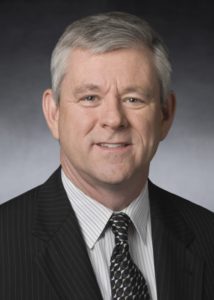 Gary Fennessy
Gary Fennessy
Vice president of corporate supply chain and hospital operations, Northwestern Memorial HealthCare, Chicago, Ill.
Northwestern Memorial HealthCare is an academic medical center affiliated with Northwestern University Feinberg School of Medicine; three acute care hospitals; 1,000 employed physicians; 1,011 hospital beds; 23 satellite ambulatory locations; approximately $650 million spend management, excluding capital.
Since joining Northwestern Memorial HealthCare more than 30 years ago, Gary Fennessy’s role has encompassed finance, revenue cycle and managed care. For the past 10 years, his responsibilities have evolved to include supply chain, as well as hospital operations, with oversight of pharmacy, labs and support services.
The Journal of Healthcare Contracting: What has been the most challenging and rewarding project you have been involved in recently?
Gary Fennessy: A simple lesson learned over time that generates tremendous goodwill is to engage caregivers in the decision-making process. The Northwestern supply chain team makes every effort to do this. For example, managing new technology and evaluating products for use was historically a challenge for us. Despite some great value analysis, the decision-making process was still a supply chain function. With the guidance of our chief medical officer, we created the Executive Medical Device Committee, comprising physician leaders across multiple specialties. We gave the group approval authority, which we controlled through guidelines and a constrained investment budget. Although our supply chain team had its doubts about handing over the decision-making process to our physicians, they have been very effective and the results have been overwhelmingly successful.
JHC: Please describe a project you look forward to implementing in the next year or two.
Fennessy: Our supply chain supports 62 operating rooms, and more than 40 percent of our total spend runs through those areas. Health system operating rooms must be optimized in terms of operational performance. If not, the ability to compete in a consumer-driven market will be at risk. Management is engaging our physicians, caregivers, IT and supply chain in a complete review of our operating room performance. We are looking to organizations outside of healthcare to see if we can identify technologies and process improvements to adopt. One opportunity that intrigues me is shifting from the use of KPIs (Key Performance Indicators) to the use of KPPs (Key Performance Parameters). Additionally, we are exploring how Northwestern can use technology to advance demand matching and anticipate inventory requirements in a more robust manner.
JHC: What is the most important quality you look for in a supplier partner?
Fennessy: Honesty and integrity are two things that come to mind. Critical to that is a recognition that we often have two distinct missions. Suppliers’ goal is to increase shareholder value, while healthcare providers look to create value-based care for patients. Meanwhile, providers operate under a constrained reimbursement model, and cost management is critical to success.
JHC: What is the greatest change we can expect to see in healthcare contracting in the next five years?
Fennessy: I believe we will see more health systems look for that bright line to quality in terms of what we pay for services in relationship to outcomes. Another challenge is shifting to view quality through the eyes of the consumer – a shift that will be challenging for many of our caregivers. Supply chain will be asked to construct contracts that align quality outcomes with price, with a focus on transparency.
